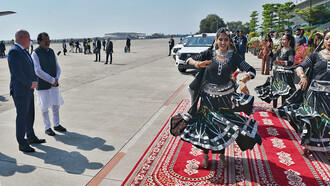The world today is not lacking activity. It is lacking orientation. We move, respond, scroll, optimize, comment, and perform. But we do not begin. We repeat what exists, reformat what is known, and label it “progress.”… What we call innovation is often just complexity rearranged. Inwardly, we are disoriented, numb, and suspended…This is … schizophrenia by design.[This is social dementia]
(Leon Tsvasman)
Humanity’s spinning coin portrays on one side a fading civilization, while etched on the other is mankind’s infinite talent. As an Earth citizen, I ask, will it fall heads or tails?
(Jeffrey Levett)
A belief in the value of human communities and the common effort of ideological restoration guided by the thought and spirit of our philosophers can unite us.
(Philosophia Ancilla)
This year, 2025, we are witnessing a nuclear arms race, NASA’s plans to put a nuclear reactor on the Moon and the outbreak in China of viral Chikungunya whose name means "that which bends-back breaking"(compare with break back fever) first identified in Tanzania. This month, August 2025, commemorates the 80th anniversary of the nuclear tragedy with the atomic bombing of Hiroshima and Nagasaki, when further drops on other Japanese targets were planned. This month will host two bright full moons, but the dark side will still be dark.
Let’s not forget that a tossed coin will ultimately fall, and its energy derived from motion will be converted into potential energy. Herein, we are talking about the dreadful toss when the chatter and rattle of the coin as it stills will be either goodbye to all of that or a philosophically modulated revival of life on Earth: ashes or blossoms. Chance will decide whether the coin’s new status presents heads or tails, or one or zero. Only mankind can determine whether a dreadful toss will have a silver lining. Let’s not forget that every toss requires a flipper and every explosion a trigger.
Fortunately, the chance of a silver lining side-up is far from zero, since no coin flipper has yet been foolish enough to use an atomic bomb after Nagasaki. In our current moment, the voices of reason must ring out! Only reason can move us to the revival of life on Earth; philosophically imbued, it can ensure acceptable equity through fairer, more efficient, and more just policies. Inspirational always: Barack’s second coming | Meer.
I was 9 years old when the first atomic bomb was dropped on Hiroshima, and I recall exactly where I was then, as I gazed at the newspaper’s front-page mushroom cloud — understanding and not — the happening of what I was viewing. In modern parlance, I was too young to fully comprehend the information I was seeing. Over the next years, my understanding would grow. Having read Children of the Dead End relating to the Irish potato famine, I read Children of the Ashes relating to death from the sky and nuclear radiation.
I was able to rationalise that the atomic bomb dropped on Hiroshima brought the war in the East to an end and that Nagasaki was unnecessary, while the combined horror of the two was a guarantee that never again would such weapons be used. The memory of overwhelming horror as expressed by rain of ruin from the air, the like of which has never been seen on this earth; a destructive force causing wholesale slaughter.would prevent it. Then came a tossed coin, both sides silver-lined; on one side was Beveridge’s model, on the other Bevan’s National Health Service. There were no losers — we were all winners — even though the Beveridge model lost out on its way to legislation. Optimal was the way for the government. It gave me some insight into what today would be labelled behavioural economics.
Later, I would use the analogue computer to simulate safe control of neutron flux in a nuclear reactor and attempt a mathematical analysis of the temperature distribution along the surface of its control rods. Much later, and in parallel to the IAEA and with WADEM, I would work on threat-to-population scenarios from external radiation as well as other hazards within the framework of disaster management. So far so good! Today, I have different thoughts, but what about tomorrow? Unfortunately, rising social dementia is driving out empathy and our empathic behaviour, making the concept of empathy less universal and more relativistic, such that death and suffering are being seen, interpreted, and conceptualised from the observer’s mindset. Today, multiple observers looking in, or from within, Gaza or Ukraine have differing viewpoints that block out the common denominator of incredible suffering and horrendous death.
Last year, the grassroots organisation Nihon Hidankyo, which represents the remaining number of hibakusha, or nuclear tragedy survivors from 1945, won the Nobel Peace Prize. At the last count, there were 99,130 hibakusha, with an average age of 86. I am 90! Their generation was harmed for life with serious knock-o effects to following generations until today.
Daily happenings and their outcomes are stormy, and they give us one description of our current world; “the world has gone mad” is another. Our world and its humanity are held in the clutches of socioeconomic dementia and wrapped in the shadow of Armageddon. This is social dementia, and my assessment of the mental state of our world. Most are certain that many things in society are not working; work can be hard to find, newly married couples cannot find a place to live, and family income runs out well before the month’s end. To put it differently, our world brutally highlights the human flaw of not being able to propose and apply a redeeming and better alternative solution to what we have, while some of the most powerful skillfully manipulate what we have for their own benefit.
The world seems not to know, not to have heard, that the complex biological systems propping up human consciousness are unravelling as a result of climate change bringing Earth warming, which slowly reduces the function of our incredible feedback mechanisms that support life (body temperature control, water balance, heartbeat and pressure, breathing, movement, etc.). Don’t you know that the Earth’s heat-regulating system is out of kilter? Overall, it takes in more joules or calories than it puts out, and it warms up! Eat more to gain weight, gain weight and run into diabetes, smoke more and more, and cancer may result, and undergo heat stress, and the blood may boil. It is difficult to confront the city hall or to confront reality.
Don’t you know that a big nuclear bang can bring civilisation and culture to an end at any unsuspected moment, and well before climate change gets around to it? Don’t you know that without a meaningful, philosophically imbued education and a mentally healthy population, a technologically manipulated future of limited free will through artificial intelligence is possible? One ugly but possible future world scenario is that the ethical rules-based global system collapses, and chaos prevails, and wars and geopolitical conflicts increase as leaders drop out of any democratic framework to become more authoritarian. Those leaders have lost touch with philosophy.
100,000 civilians were killed in the first seven seconds of the explosion. The third bomb was not to be used without express presidential instruction. What was revealed in Japan was the equivalence between the energy release and mass and the speed at which light travels multiplied by itself (E=mc²). [Cf. with floodwaters, whose destructive force — kinetic energy — increases with the flow velocity squared.] Countless unanswered whys and declarations, and so-whats prevail. The tragedy of the two Japanese cities in 1945 should have precluded states from further developing atomic bombs. Eighty years on, more and more we ask: was it necessary? Was it right?
The few boats rowing towards peaceful shores are few and need retrofitting as they deal with countercurrents and are denied entry into safe harbour. Wake up, world; listen and think; provide a better compass. Let’s cling on, though, to a world where the creativity of human beings is infinite and man’s talent profound. We are running out of time and with a universal lack of cooperation capabilities any positive outcome can be limited. We must react and act now before it is too late.
Irina Bokova said that philosophy instills humility, while her successor as Secretary-General of UNESCO, Audrey Azoulay, said philosophy is a bastion against the narrowness of views and minds. The Secretary General of the United Nations, Antonio Guterres, has indicted the low moral status of our world and has said that humanity has opened the gates of hell. As his predecessor Ban Ki-moon left the UN, the Doomsday Clock stood very close to midnight. When last in Athens to examine the plight of migrants in search of a safe port, he received a symbolic life jacket. Even though I thought it cynical, its symbolism is more pertinent than ever. Unfortunately, the international community has given up on philosophy. I can tell you that when he was in Zagreb, he visited the School of Public Health.
In Athens, in spite of a standing invitation, he was steered past its door. They seemed to agree that the greater the difficulty of finding solutions to a problem, the greater the need for philosophy, reflecting Molière’s “the greater the obstacle, the greater its overcoming glory.” But then they abandoned it! Is this induced apathy born of trying, of hitting one’s head against a brick wall for so long, a case of no one listening?
Surrounded by threats, people the world over are alarmed. Avoiding demise becomes the most important and pressing goal. Turning away from harsh reality today will only compromise our children tomorrow and then their children the day afterwards. Instead of turning away from harsh reality, we have to face it! However, no one can predict how the new Genesis will reshape the world or modulate its mindset, but empathy can be given a chance.
As Global citizens and citizens of the earth, we must seek that elusive silver lining. As the Honorary President of the World Philosophical Forum, I support all policies whose aim is to improve the quality of life and the healthy well-being of the world’s population. Planet Earth is threatened with drought and food insecurity and environmental pollution, and radiation (side one), but it is not lacking in water, food, or brains (side two), and winners and losers are generated as a result of problematic distribution (wealth, resources, know-how). React now,! Act now so that our children and our children’s children will be winners and not children of some dead end.
Notes
1 Inspirational always: Barack’s second coming.
Togo T., Levett J., (2009). Health Diplomacy as An Aid to Human Security, 12th World Congress on Public Health, Istanbul, WFPHA.
Levett, J. (2007). Radiological terrorism scenarios. Prehospital and Disaster Medicine, 22(4), 346.
Levett, J. (2015). Disastrous events and political failures. Prehospital and Disaster Medicine, 30(3), 227–228.
Levett, J. (2004). A new opportunity for public health development: Athens 2004. Prehospital and Disaster Medicine, 19(2), 130–132.















